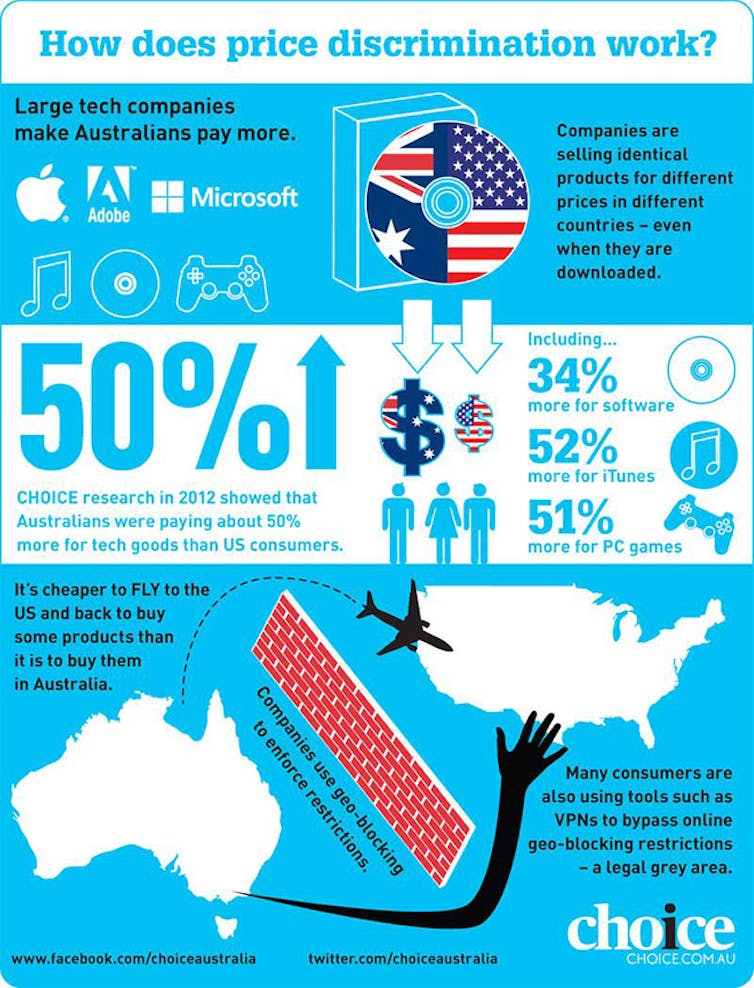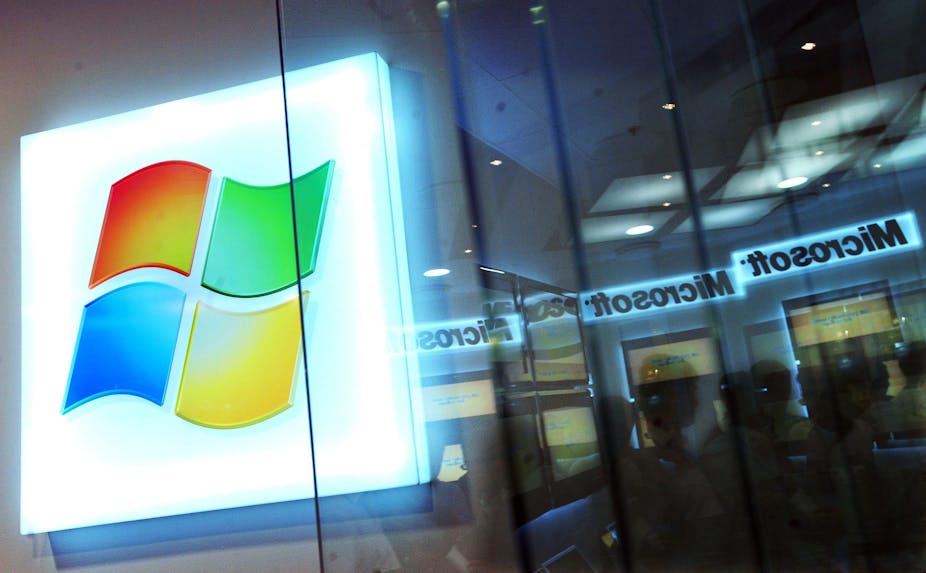Today, an Australian parliamentary committee grilled the IT titans - Apple, Adobe, and Microsoft - on price discrimination against Australian consumers. The IT companies were evasive under questioning.
The House of Representatives Committee on Infrastructure and Communications issued a summons to Apple, Adobe, and Microsoft to appear before the Parliament.
The Committee is investigating the impacts of prices charged to Australian consumers for IT products. The Committee has been examining claims by consumer advocates CHOICE Australia and the Australian Communications Consumer Action Network that Australian consumers have been the victims of price gouging.
The inquiry into IT pricing has grown into a larger public debate about copyright law, consumer rights, and competition in the digital economy. Harrison Polites has observed that the Labor member for Chifley, Ed Husic, has transformed the inquiry into “a debate in microeconomics that has significant implications for Australia’s national economy”.
Apple’s cloak of invisibility
Husic has said that Apple has sought to hide under “a cloak of invisibility” in a number of Australian policy debates.
With some reluctance, Apple’s written submission was published. At the IT pricing inquiry, Apple Australia vice-president Tony King blamed copyright rights-holders for price discrimination in Australia. However, the relationship between Apple and copyright owners has been competitive — and sometimes collusive.
Apple has been under investigation for its collaboration with publishers on setting e-book prices both in the United States and the European Union. Tim Cook, the chief executive of Apple, has been ordered to testify in the United States case.
One has to wonder whether Apple has sought to collaborate with copyright owners in price-setting in Australia.
CHOICE Australia has observed disparities in pricing on iTunes between Australia and the United States. Rihanna’s latest album Unapologetic costs A$22.99 in the Australian iTunes store, but only $15.99 in the United States. Australian fans of the Boss, Bruce Springsteen- such as the Treasurer Wayne Swan - would pay $AU16.99 for his Greatest Hits on iTunes, whereas purchasers Born in the USA would only pay $US11.99. Matthew Levey from CHOICE Australia wondered: “Why is it costing Australians 70% more to rock out to AC/DC’s Back in Black on iTunes?” Parliamentarian Paul Neville was particularly aggrieved about the high cost of the works of Led Zeppelin on Australia’s iTunes.
Stephen Jones MP raised questions about whether Apple was a dominant market power in the IT field, much like Woolworths in agriculture. King denied that Apple was like Woolworths. He suggested that Apple was comparable to JB Hi-Fi, much to the scepticism of the committee.
Adobe’s acrobatics
In contrast to Apple, Adobe sought to deflect criticism of its pricing in the Australian policy debate.
Adobe’s managing director Paul Robson appeared before the committee, and failed to justify why Australian consumers paid higher prices for software. At one point, he suggested Australians could fly to the United States, if they wanted cheaper prices of boxed Adobe products.
Elsewhere, Adobe’s chief executive, Shantanu Narayen, has defended the software prices in Australia. He has maintained: “You always have to look at different pricing in different regions and we do the research just like other companies … We look at the appropriate pricing and the value associated with products everywhere.”
Under pressure, Adobe announced that it would cut its Australian prices in respect of cloud-based software services the Creative Cloud.
However, Adobe has come under attack for making token concessions in the IT Pricing debate. Such statements have been seen as a public relations smokescreen.
CHOICE Australia CEO Alan Kirkland said: “If Adobe was genuine about treating consumers fairly, it would have reduced prices across all of its products.”
Adobe has been reliant upon technological protection measures, digital locks, and geoblocking. Husic suggested that Adobe took a medieval approach to IT pricing, with “regional fiefdoms”. Stephen Jones MP commented that Adobe “digitally handcuffed” its consumers.
Adobe threatened that if geoblocking was prohibited in Australia, it would reconsider its willingness to invest in local IT.
The Microsoft monopoly
The United States multinational software company Microsoft - founded by Bill Gates and Paul Allen - made a written submission to the inquiry. Microsoft’s Pip Marlow appeared before the inquiry.
CHOICE Australia has been damning about prices charged by Microsoftin Australia compared to the United States: “Software is another product that is broadly the same regardless of where it is sold, yet still attracts price differentials.” Microsoft’s Office Professional 2013 software package costs A$599 to download in Australia, but merely $399.99 at the United States Web store.

Microsoft has been unapologetic about its price discrimination in relation to its services. The company maintains that “the costs of providing the services - including establishing, maintaining, supporting and advertising the services - needs to be recovered and a profit from those operations derived, in order to contribute to the overall return on the company’s investment”.
Microsoft has long been an intellectual property maximalist, both in terms of litigation and policy debates. Along with Adobe, Microsoft is currently suing a Dubbo radio station for copyright infringement, with the accusatory rhetoric of “software piracy”.
Law reform
Given the great public interest in the inquiry into IT pricing, it will be striking to see whether the Committee will respond to proposed legislative action to address geo-pricing and geo-blocking.
The inquiry has highlighted the need for copyright law reform to protect the interests of consumers. In the wake of the March 2013 case of Kirtsaeng vs John Wiley & Sons, there is a need to reconsider Australia’s ancient parallel importation restrictions.
Similarly, there is a need to revise the copyright laws regarding digital locks - technological protection measures. Digital locks have had many unintended consequences- including jeopardizing consumer rights, chilling free expression and scientific research, and impeding innovation and competition. The author Cory Doctorow has been an eloquent critic of digital locks:
In a piece for Wired, Kyle Wiens wrote that there was a need for real copyright law reform to unlock content. “Copyright is impacting more people than ever before because the line between hardware and software, physical and digital has blurred … once we buy an object — any object — we should own it.”
The Australian Competition and Consumer Commission (ACCC) has been impressive during the debate over IT pricing in Australia.
The chairman of the ACCC, Rod Sims, has observed that his agency will take action if there is evidence of violations of Australian consumer law or competition law. He has observed: “If we can find one where we think the representation made looks to be significantly divorced from reality and we think it’s one of general use, then we’ll certainly take action”.
However, some of the government departments and agencies seemed somewhat apathetic about the topic of IT pricing, and lacking initiative in formulating policy responses - which is disappointing, given the great public interest in the subject.
Ultimately, the inquiry into IT Pricing will be judged by the efficacy of its outcomes - whether they have an instrumental impact in lowering the prices of copyright works in Australia.
International trade
The inquiry into IT pricing, and the interrogation of Apple, Adobe, and Microsoft, has generated much domestic and international interest.
There has been much interest in New Zealand as to whether there should be a similar inquiry into IT pricing. Northwestern University law students from Chicago have flown from the United States to follow the inquiry. International press agencies - like Bloomberg and the BBC - have sought to cover the public grilling of the IT titans.
The inquiry has also raised questions as to the impact of the Trans-Pacific Partnership upon consumer rights. The United States Trade Representative’s controversial proposed ban on parallel importation in that agreement runs counter to both recent United States precedent, and the Australian inquiry into IT pricing.

